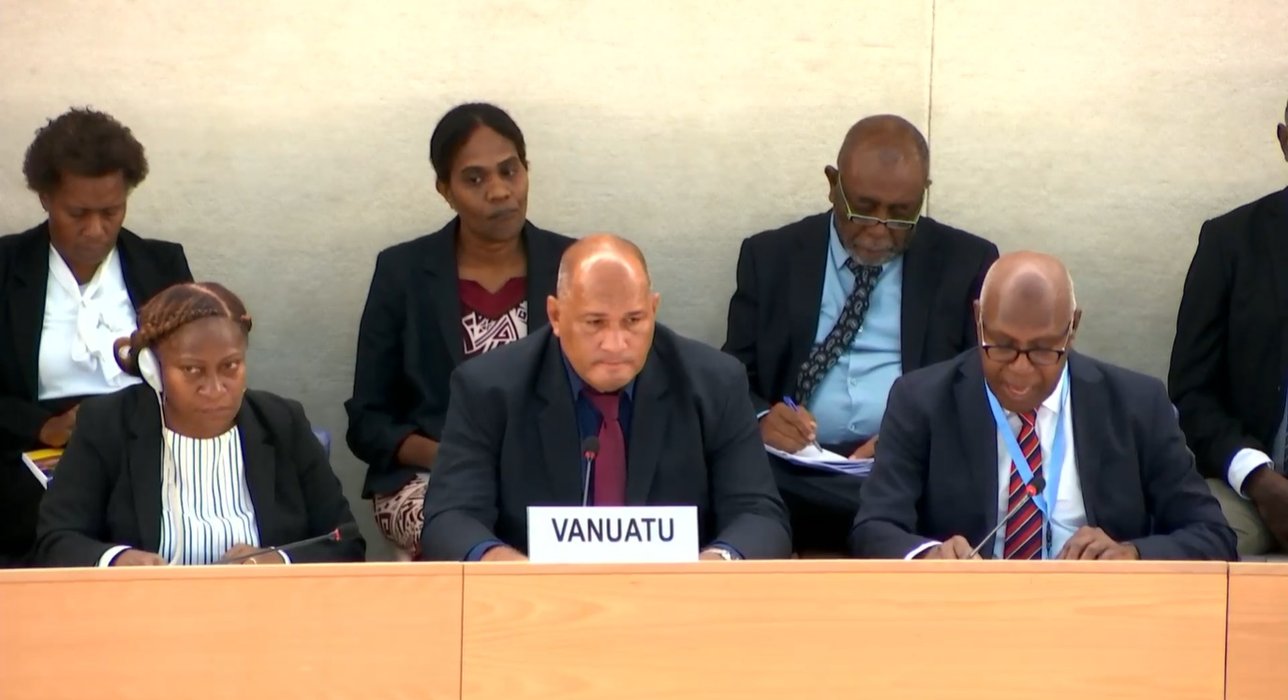
The state of civic space in Vanuatu is rated as ‘narrowed’. Among ongoing concerns are the criminalisation of freedom of expression online under the Cybercrime Act No. 22 of 2021, as well as criminal defamation provisions in the country’s Penal Code Act that could be used to silence the media and critics.
In May 2024, Vanuatu’s human rights record was reviewed at the UN Human Rights Council as part of its Universal Periodic Review (UPR). It received recommendations to protect the rights to freedom of speech, expression and the press and ensure adequate protection for members of the media, civil society and individuals who peacefully exercise their right to freedom of expression. States also call for the repeal of new provisions in Vanuatu’s Penal Code Act which have criminalised defamation since 2021.
The UPR review is due to be adopted by the UN Human Rights Council at the end of September 2024 and the government has to make public the recommendations it will support.
In June 2024, Vanuatu backed changes in a referendum called by Vanuatu's Prime Minister Charlot Salwai aiming to end political instability in the country. Voters were asked in the referendum — held over several days in late May and early June — whether they supported reforms aiming to stop MPs crossing the floor of parliament.
One of the two reforms put to voters would mean MPs lose their seats if they are expelled from their party. Under the second reform, independent MPs would have to affiliate with a political party, or have their seats vacated. It was Vanuatu's first referendum since it gained independence from Britain and France in 1980.
Expression
Concerns about defamation laws
Ahead of the UPR review, the UN Country team noted reported cases of elected officials being accused of threatening journalists for critical reporting and of the enforcement of criminal libel laws to limit freedom of expression. It highlighted that the Penal Code allowed for prosecution for making false statements on the Internet. The United Nations Educational, Scientific and Cultural Organisation (UNESCO) noted that defamation was criminalised under the Penal Code.
Amnesty International also asserted that the right to freedom of expression lacked adequate protection in law and practice and drew attention to concerns about the criminalisation of freedom of expression online, including under the Cybercrime Act No. 22 of 2021, and the re-introduction of criminal defamation provisions under Articles 120 and 121 of the Penal Code Act, and related arrests.
As previously documented, in 2022, individuals were arrested under the Cybercrime Act for posting comments on social media, critical of politicians during the COVID-19 outbreak.
Calls for appointment of an Information Commissioner and adequate resources
Transparency International Vanuatu (TIV), Port Vila, also raised concerns around the right to freedom of information. The organisation commended the adoption of the Right to Information Act in 2016, providing for the appointment of an Information Commissioner to hear, investigate and make a decision on appeals filed under the Act and to monitor compliance by government agencies with the Act.
TIV noted that the Right to Information Unit did not have its own budget as a statutory institution, which had limited its work, and that an Information Commissioner was yet to be appointed. TIV recommended that Vanuatu take appropriate measures to strengthen the work of the Unit in promoting the right to information, especially in the rural areas, by allocating adequate resources to the Unit, and appoint an Information Commissioner to ensure that the Right to Information Act could be implemented.
Association
Teachers’ strike continues as government fails to deliver on agreement
Fantastic to catch up with the Vanuatu Teachers Union today. They have been on strike since last Friday fighting for better pay and conditions. There’s power in union @iam_singhanand @AEUfederal @daveswords pic.twitter.com/GwqGpZZwXg
— Correna Haythorpe🌈 (@CHaythorpeAEU) June 14, 2024
On 10th June 2024, members of the Vanuatu Teachers Union (VTU) went on strike. More than 1,000 teachers, mostly from public schools, walked off their jobs.
The teachers were demanding that their budget be managed by the Teaching Service Commission (TSC) as their employer, rather than being controlled by the Director General (DG) of the Ministry of Education and Training (MoET).
VTU's Secretary General (SG) Jonathan Yona said this arrangement would enable the employer to promptly address their grievances, like outstanding payments and housing. There are around 1,467 teachers who are active members of VTU.
In his response, DG of Education Bergmans Iati said the industrial action constituted a contempt of court, as a case regarding the matter is currently before court. He said those involved in the strike will be dealt with according to the law. These threats against the union are inconsistent with Vanuatu's human right obligations to respect and protect the right to strike which is guaranteed under Article 22 of the International Covenant on Civil and Political Rights (ICCPR).
According to Freedom House, the right to strike is somewhat impaired by notification rules and the government’s ability to bar such actions by essential services. Violations can draw criminal penalties.
On 19th June 2024, the strike was called off, after an agreement was reached with government. Jonathan Yona said the agreement required government to come up with a plan on how it will pay entitlements.
In August 2024, the VTU recalled the industrial action after negotiations failed to resolve the dispute. Jonathan Yona stressed that their demand for VT20 billion payment to members remained unmet despite exploring all legal avenues through a Collective Bargaining Agreement (CBA). The VTU also confirmed its intention to take legal action against the Teaching Service Commission’s (TSC) decision to suspend some school principals without pay due to the ongoing industrial action.